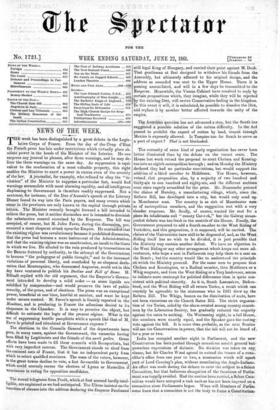NEWS OF THE WEEK.
HE week has been distinguished by a great debate in the Legis. T
Wive Corps of France. From the day of the Coup d'Etat the French press has lain under restrictions which virtually place ab- solute power in the hands of the Minister of the Interior. He can surpress any journal he pleases, after three warnings, and lie may de- liver the three warnings on the same day. As suppression is equi- valent to the confiscation of a most valuable property, this right enables the Minister to exert a power in excess even of the severity of the law. A journalist, for example, who refused to obey the "in- vitation" of the Minister to suppress a particular fact, would find warnings accumulate with most alarming rapidity, and all intelligence displeasing to Government is therefore readily suppressed. Not a sentence, for instance, of the Duc d'Aumale's speech at the Literary Dinner found its way into the Paris papers, and many events which occur in the provinces are only known to the capital through private letters. The Minister recently brought forward a bill intended to relieve the press, but it neither diminishes nor is intended to diminish the substantive control exercised by the Emperor. The bill was accepted, of course, but M. Jules Favre, during the discussion, pro. nounced a most eloquent attack upon the Empire. He contended that the existing regime was revolutionary because it prohibited discussion, that the press had become a mere instrument of the Administration, and that the existing regime was an anachronism, an insult to the times in which we live. He alluded to the ruin produced by transactions on the Bourse fostered by authority, to the attempt of the Government to become "the pedagogue of public thought," and to the incessant violations of personal liberty, and concluded by an eloquent decla- ration that Montesquieu, who denounced Augustus, could not in this day have ventured to publish his Decline and Fall of Rome. M. Billault replied with the old argument, that the Emperor's Govern- ment intended to develop a solid order — as some liquids are solidified by compression—and would preserve the laws of public security, of the press, and of elections. The press was an exceptional power, beneficial at one 'time, hurtful at another, and must be kept under severe control. M. Favre's speech is frankly reported in the Monileur, and is producing in France the adhesions denied to its eloquence in the Chamber. It is easy to perceive the object, but difficult to estimate the logic of the present regime. What is the use of suppressing hostile pamphlets while a speech like that of M Favre is printed and circulated at Government expense ?
The elections to the Councils General of the departments have gone, in many cases, against the Government, the vacancies having been filled by Legitimists and the friends of the parli prelre. Great efforts have been made to fill these councils with Bonapartists, but with very imperfect success. The Government stands so aloof from the eminent men of France, that it has no independent party from which to select qualified nominees. The mass of the voters, however, in the great towns decline to vote, a fact favourable to Government which could scarcely coerce the electors of Lyons or Marseilles if unanimous in voting for opposition candidates.






























